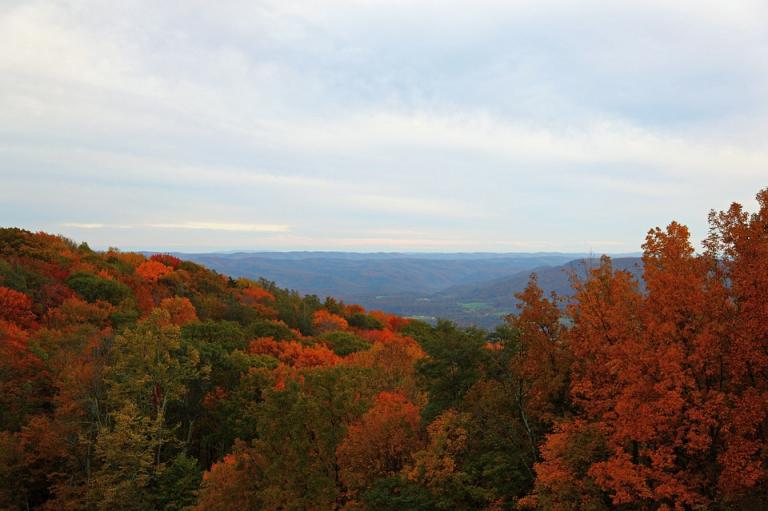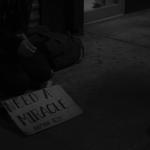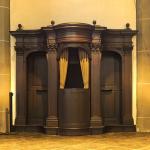
It started when a neighbor messaged me late at night. She said that she hated to ask, but another neighbor I didn’t know very well was desperate for a ride to another city more than an hour away, and it had to be tomorrow, and she had to be there before noon. The neighbor had no car to get there and they’d tried asking everybody else. They could buy me lunch and give me fifty dollars for gas, if I’d drive the woman in the Neighborhood Trolley.
I didn’t like to take the fifty dollars, but we had nothing at all in the checking account. So the next morning I took the cash, and I took Rosie, and we drove off through the shale cliffsides of eastern Ohio.
I have told you so much about the ugliness of the Ohio valley. But you’d never know it was ugly from that stretch of the freeway. It looks beautiful there– particularly in Autumn when the trees are going gold, on a quiet morning that’s alternately rainy and calm. I wanted to drive forever.
The neighbor didn’t speak much; she dozed, nearly dropping her phone which was dictating directions at me. I hadn’t exactly asked her where we were going with such urgency, after she thanked me profusely and handed me a folded bill. I just told Rosie we were going to a nearby city, and perhaps there’d be a park to play in, but at least we’d get out of the house.
I don’t think the neighbor recognized me. I recognized her right away, as soon as I saw the face that went with the name I’d been given. I’d know her anywhere.
I knew her when she was a child and I was only slightly older. I don’t know exactly how old she was, but if she was fifteen when I met her she was barely fifteen. She was one of the big group of children who came to the soup kitchen on Saturday evenings when there was dinner with sheet cake and punch. The soup kitchen is in the basement of a great big beautiful Protestant church. My friends and I had a sanctimonious “ministry;” we’d go downtown in a bus from Franciscan University’s campus and lead Praise and Worship in that church. After Praise and Worship we’d help serve everyone a meal, divide the children into age groups, and try to teach them something about the Bible. I had the younger children in my group, including that messy little girl I’ve called Diamond. I loved teaching little children. I had it on good authority that I was so unattractive I’d never marry and had no hope for little ones of my own, so I read Bible stories to the children at the soup kitchen. The other Franciscan students taught the teenagers.
We were from privileged, middle or upper class, conservative families, and we didn’t have a clue. I imagined that I was going to instruct and teach them, and “show them a better way.” At the time, I truly believed that poverty was a choice– the choice of the poor person, I mean. Of course it’s the result of somebody’s choices. But I thought that by just choosing to do so, a young person could guarantee that they didn’t grow up to be poor, they didn’t end up on drugs or committing crimes, they wouldn’t have a “broken home” and find themselves raising children alone. I had no idea what poverty and desperation can do to a family. I didn’t know how the generational agony of families trapped in a traumatized neighborhood could affect a person. I didn’t understand any of that.
Our “ministry” harangued the children about this and that every Sunday night. We told them about responsibility, about how bad drugs were, and how your virginity is something you can never get back. The children thought we were ridiculous, but they enjoyed the music, the free meal and the cake.
I was so neurotic that when that teenage girl revealed that she was pregnant for the first time, I blamed myself. We Bible study leaders clearly hadn’t “showed her a better way” hard enough, or this never would have happened. Now she would never break the cycle of poverty and move on to better things. She’d be stranded in Steubenville unlike people who made good choices. I was so distraught that I went to confession about it. The priest thought I was as ridiculous as the children did, but he was kind.
The soup kitchen volunteers fundraised to get the girl a car seat for the baby. I started a new semester and took a different hour to volunteer at the soup kitchen. I didn’t see her again for over a decade. I myself got married, came down with a chronic illness, and found myself poor and trapped in Steubenville with a traumatized family and no hope of a better way. And now that girl was sleeping in my passenger seat while her phone directed me across the Ohio Valley.
Eventually, we arrived at a hospital. The neighbor woman went inside, and came out with a tired-looking teenage girl. It turned out that my neighbor’s daughter had been ill, and had taken a turn for the worse. She’d been transported in an ambulance to a better hospital than we had locally. But the ambulance couldn’t take her back. She needed to be picked up in a car.
The child looked about as old as her mother had been when I first knew her.
I kept glancing back at that child, sitting next to Rosie in the backseat.
Her mother and I are so much older. So many, many things are have changed now.
We used to be something quite different, but now we are mothers.
The rain had blown over completely when we got back to Steubenville. The ground was shiny with water, the trees were colorful and warm, the sky was eerily bright. For just a moment, everything I looked at seemed mysterious and new.
I realized for just one fleeting second that I don’t understand anything at all, but Someone else understands everything.
Image via Pixabay
Mary Pezzulo is the author of Meditations on the Way of the Cross and Stumbling into Grace: How We Meet God in Tiny Works of Mercy.
Steel Magnificat operates almost entirely on tips. To tip the author, visit our donate page.













